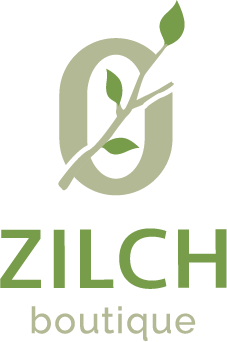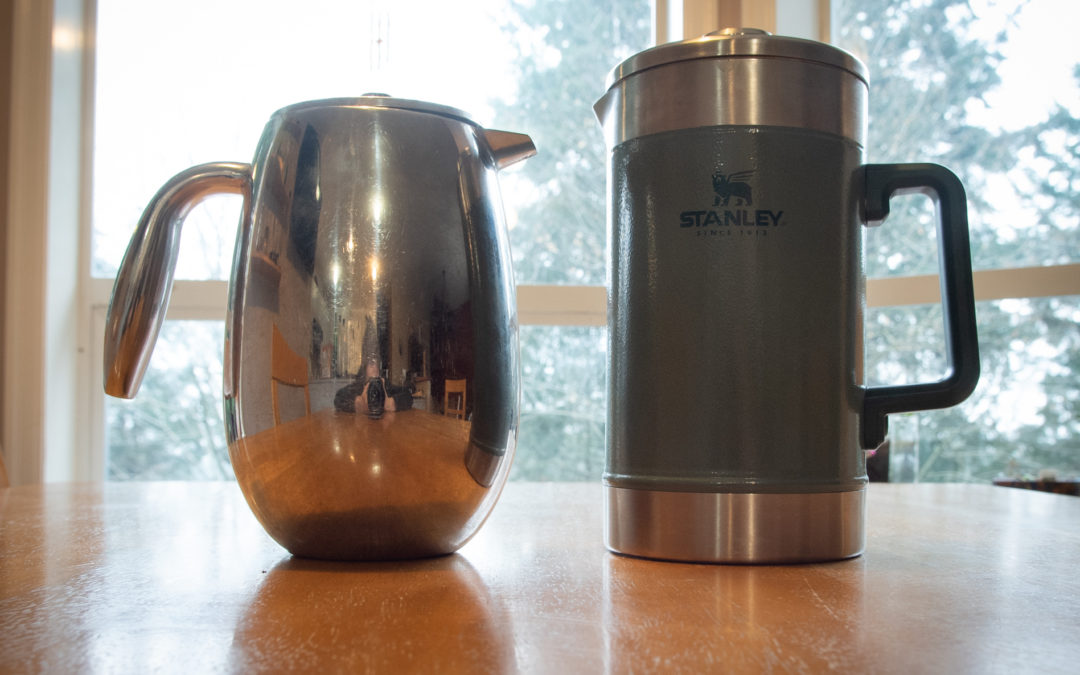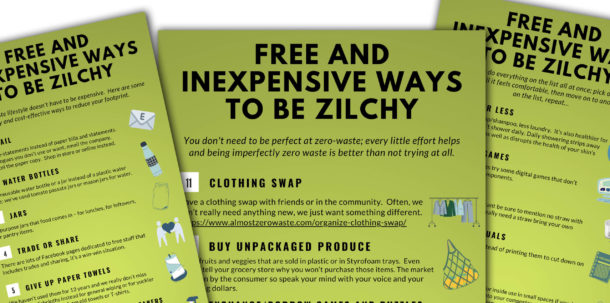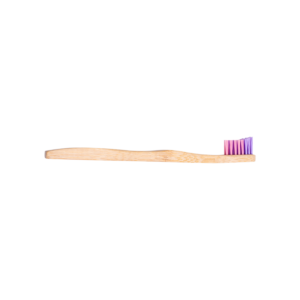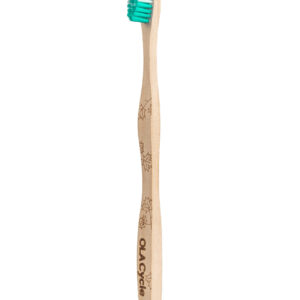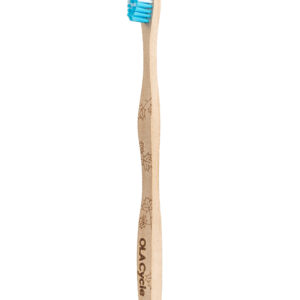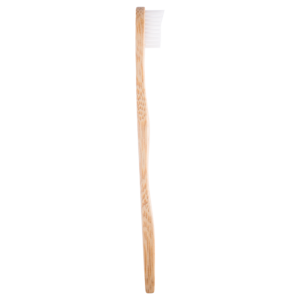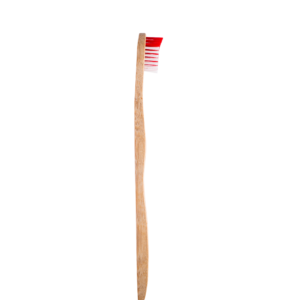Making coffee at home has made a comeback!
With many people staying home due to the pandemic, fewer people are buying coffee to go. I have always tried to avoid using single-use cups, as only 1% of paper cups that are produced globally are recycled. With the waxy liner on the inside of the cup, it makes it nearly impossible to recycle anyway. There are many waste-free ways to enjoy coffee at home, or even on the go.
At Home:
Making coffee at home is the most affordable, earth-friendly way to make coffee, so try to make it at home as much as possible. When making coffee, always use what you have and don’t go out and buy a new low-waste option. Depending on what you’re already using, there are many ways to adapt your current routine to make it zero-waste.
French Press: My favourite way to make coffee is with my french press. It is completely zero waste, easy to make weaker or stronger and pretty quick to make. The French presses are usually stainless steel and/or glass, making them long-lasting and easily recyclable/repurposed once they reached the end of their life.
Re-Usable Filters: If you make your coffee in a way that requires a filter, try using a reusable fabric filter. They are washable and long-lasting. Stainless steel filters are also a great alternative to paper filters. Many pour-over systems use a reusable filter and are a great way to make a single cup of coffee to ensure there is no waste, but who drinks only one cup?
Moka Pot: One of my roommates is a sucker for good coffee. She has tried many different ways to create that perfect cup, but her favourite is her traditional Italian stovetop Moka pot. It’s stainless steel and just requires some coffee grounds, water and your stovetop. It’s great for making strong espresso completely zero-waste.
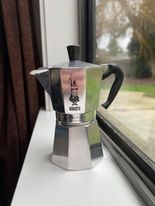
K-Cups: K-Cups, in my opinion, is just bad news! From the beginning, they have been a very wasteful option for making coffee. The pods themselves are not recyclable in most places and are made up of aluminum and plastic, both known for potential carcinogens. K-Cups have produced so much trash that they could wrap around the planet more than 10 times. If you own a K-Cup machine, luckily there are alternatives to those nasty single-use pods. Today, you can find small refillable K-Cups. These are a gamechanger for those who already own a machine, and love the fast, single-cup coffees.
Buying Coffee Beans: When buying coffee for your home, consider buying your coffee in bulk. Many bulk sections in grocery stores will have coffee, and some will let you bring your own container to refill. Some local coffee shops will roast their own coffee or will use a locally roasted bean, many of these places will also have these coffees available for purchase. Important things to look for when buying coffee are Fair Trade, organic, Rainforest Alliance, and shade-grown coffee. It may be hard to find a coffee that checks all these boxes, but do your best to find the best option for you.
Coffee Afterlife: With any of these zero-waste options, you are going to have used coffee grounds. If you are tossing these grounds, be sure to compost them, rather than throw them into the trash. Alternatively, these grounds can be used for many things to give them a second life! One of my favourite ways to reuse my grounds is to use them to make a body scrub. It’s so exfoliating and moisturizing. The coffee grounds are also great for gardens and houseplants.
If you have leftover coffee, try pouring the coffee into ice cube trays and freezing them. They are great for iced coffee, without watering it down! Leftover coffee can also be used in desserts, meals and marinades. The possibilities are endless.
Coffee To-Go:
If you are out of the house and are grabbing a coffee, be prepared and have your reusable mug. With COVID, some places may not take your reusable mugs, but I find small, local cafes will fill them for me. If you forget your reusable mug and you have some time, ask for your coffee to stay. Many places don’t advertise their to-stay mugs, but many will have them if you ask. I personally will avoid a place if I know they don’t have to stay mugs, or if they will not fill my to-go mug. If enough people ask these things, it may influence cafes to rethink their options. As always, it is better to support the small, local cafes, rather than the big chains.
Changing small habits in our daily life can have a tremendous effect on the environment. With 2.25 million cups of coffee consumed daily around the world, we have to choose the most environmentally friendly options to limit the impact on our planet. Every little bit helps and being imperfectly zero waste, is better than not trying at all.
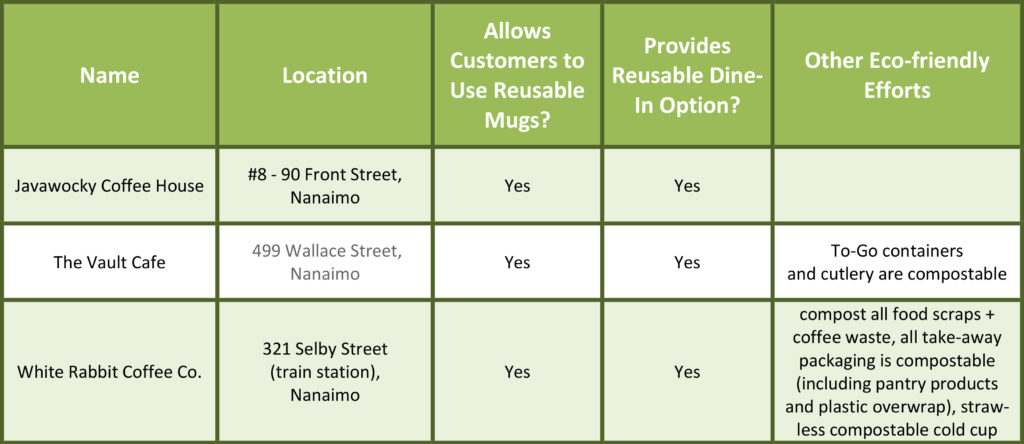
Where to get coffee around Nanaimo in your own travel mug
For more resources for living zero-waste: https://zilchboutique.com/resources/
